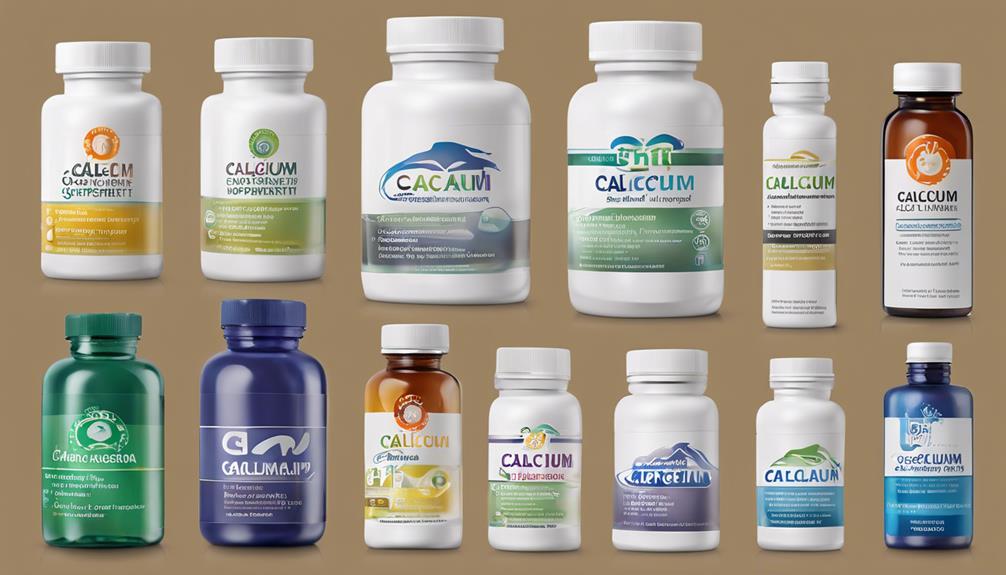How to Choose the Best Calcium Supplements for Women’s Bone Health
When it comes to selecting calcium supplements for women's bone health, you need to navigate through a sea of options to find the most suitable one. Factors like the type of calcium, absorption enhancers, and additional nutrients all play a role in determining the best choice for your bone health needs. But there's one crucial aspect that often gets overlooked, something that could make a significant difference in how effective your calcium supplement truly is. Stay tuned to discover this key factor that could impact your decision-making process immensely.
Importance of Calcium for Women
Calcium is a crucial nutrient for women, playing a vital role in maintaining bone health throughout their lives. Adequate calcium intake is essential for preserving bone density, especially as women age. During menopause, the risk of osteoporosis and fractures increases due to hormonal changes impacting bone strength. Ensuring you meet your daily calcium requirements can help mitigate these risks.
Bone density refers to the strength and mineral content of your bones. Calcium is a key component in maintaining optimal bone density, which is crucial for overall bone health. As women go through menopause, the body's estrogen levels decrease, leading to accelerated bone loss and an increased risk of fractures. Adequate calcium intake can help offset these effects and support bone strength.
To protect against menopause-related bone risks, including fractures and osteoporosis, it's vital to prioritize calcium-rich foods and, if needed, consider calcium supplements to ensure you meet your daily requirements. Remember, maintaining adequate calcium levels is a proactive step towards supporting your bone health as you navigate through different life stages.
Types of Calcium Supplements
Maintaining optimal bone health requires a comprehensive approach that includes considering the types of calcium supplements available to support your daily intake. Calcium supplements come in various forms, each with different absorption rates and sources.
Calcium carbonate, found in products like Tums, has a high elemental calcium content but is best absorbed when taken with food due to its dependence on stomach acid. Calcium citrate, on the other hand, can be absorbed well with or without food and is a suitable option for individuals with low stomach acid production.
Other types such as calcium gluconate and calcium lactate are less commonly used due to lower elemental calcium content.
When choosing a calcium supplement, consider your dietary sources of calcium and any absorption issues you may have. While dairy products, leafy greens, and fortified foods are excellent dietary sources of calcium, supplements can help fill gaps. Understanding the absorption rates and sources of different calcium supplements can aid you in selecting the most suitable option to support your bone health.
Absorption Factors to Consider
To optimize the effectiveness of calcium supplements for your bone health, it's crucial to consider various absorption factors that can impact how well your body absorbs this essential mineral. Absorption enhancers such as vitamin D, magnesium, and vitamin K2 can help improve the absorption of calcium. These nutrients work synergistically to enhance the uptake of calcium into your bones.
Additionally, timing considerations play a significant role in maximizing calcium absorption. Taking calcium supplements with meals can increase absorption as the presence of food in the stomach triggers the release of digestive acids that aid in calcium absorption. However, it's important to avoid taking calcium supplements with high-fiber or high-oxalate foods as they can interfere with calcium absorption.
Dosage Recommendations for Women
For optimal bone health, ensuring you receive the right dosage of calcium supplements is essential. The daily intake of calcium varies depending on age group.
Women aged 19-50 should aim for 1,000 mg of calcium per day, while women over 50 should increase their intake to 1,200 mg daily. It's important to spread this dosage throughout the day, as the body can only absorb a limited amount of calcium at once.
As women age, their bones naturally weaken, increasing the risk of fractures and osteoporosis. Adequate calcium intake can help maintain bone density and prevent these issues.
However, taking too much calcium can lead to kidney stones or other health problems. It's crucial to follow the recommended dosage guidelines and consult with a healthcare provider if you have any concerns.
Additional Nutrients to Look For
Regularly consuming calcium supplements is crucial for women's bone health, but it's also important to consider additional nutrients that can complement calcium's benefits. When choosing a calcium supplement, look for those that include Vitamin D, as it plays a vital role in calcium absorption.
Vitamin D works synergistically with calcium, ensuring that your body can effectively utilize the calcium you consume to support bone strength. Additionally, magnesium is another essential nutrient to seek in your calcium supplement.
Magnesium benefits bone health by assisting in the conversion of Vitamin D into its active form that helps with calcium absorption. Furthermore, magnesium aids in bone formation and density, making it a valuable addition to your bone health regimen.
Therefore, selecting a calcium supplement that includes Vitamin D for synergy and magnesium for its bone-supporting benefits can enhance the overall effectiveness of your bone health routine.
Choosing the Right Form
Considering the importance of additional nutrients in enhancing the benefits of calcium supplements for women's bone health, the next crucial factor to focus on is selecting the right form of calcium supplement.
When choosing a calcium supplement, it's essential to consider dosage guidelines to ensure you're meeting your specific needs. The absorption rates of different forms of calcium supplements vary, impacting how effectively your body can utilize the calcium.
Calcium carbonate, for example, should be taken with food to enhance absorption, while calcium citrate can be taken with or without food since it doesn't require stomach acid for absorption. Other forms like calcium gluconate and calcium lactate are also available, each with their own absorption rates.
To optimize the benefits of your calcium supplement, consider factors such as your diet, age, and any existing health conditions that may affect absorption. By understanding dosage guidelines and absorption rates, you can choose a calcium supplement that best meets your individual needs for supporting strong and healthy bones.
Quality and Purity Standards
To ensure that you're choosing a high-quality calcium supplement for women's bone health, it's essential to pay attention to quality and purity standards. When looking at calcium supplements, consider the testing procedures and manufacturing processes used to ensure the product's quality and purity.
High-quality calcium supplements undergo rigorous testing procedures to verify their potency and purity. Look for supplements that have been tested by third-party organizations to confirm that the stated calcium content matches what's actually in the product. These tests can also detect any potential contaminants, ensuring that you're consuming a safe and effective supplement.
Additionally, the manufacturing processes play a crucial role in determining the quality of the calcium supplement. Opt for products manufactured in facilities that follow strict quality control measures to prevent contamination and maintain product consistency.
Budget-Friendly Options
For those seeking calcium supplements that support bone health without straining their wallets, exploring budget-friendly options can be a wise choice. When looking for affordable options to promote bone health, consider the following:
- Generic Brands: Many store brands offer calcium supplements at lower prices compared to name brands, with comparable quality.
- Bulk Purchases: Buying in larger quantities often leads to cost savings per dose, making it a budget-friendly option in the long run.
- Online Retailers: Online platforms frequently provide discounts and promotions on calcium supplements, allowing for cost-effective purchases.
- Seasonal Sales: Taking advantage of seasonal sales or promotions can help you secure affordable calcium supplements while saving money.
- Cost Comparison: Before making a purchase, compare prices across different retailers to find the best deal on your preferred calcium supplement.
Frequently Asked Questions
Can Calcium Supplements Interact With Other Medications?
Yes, calcium supplements can have potential interactions with other medications. It's crucial to consider medication compatibility to avoid adverse effects. Always consult your healthcare provider to ensure the safe and effective use of calcium supplements alongside other medications.
Are There Any Side Effects of Long-Term Calcium Supplementation?
Long-term calcium supplementation may lead to side effects such as kidney stones and constipation. It's essential to monitor your intake and consult a healthcare provider for guidance on managing potential risks while supporting bone health.
Can Calcium Supplements Be Taken on an Empty Stomach?
On an empty stomach, calcium supplements may be taken, but it's recommended to consume them with a meal. Fasting effects absorption rates, so having food with your supplement helps maximize absorption and minimize potential digestive discomfort.
How Soon Can Women Expect to See Improvements in Bone Health?
You should notice improvements in bone health within 6-12 months of consistent calcium supplementation. Monitoring progress through bone density scans or blood tests can help track changes. Your commitment to calcium intake is crucial for optimal results.
Are There Any Specific Calcium Supplements Recommended for Menopausal Women?
When choosing calcium supplements for menopausal women, specific recommendations can vary based on individual needs. It's important to consult with a healthcare provider to determine the best option that meets your unique requirements.
Conclusion
In conclusion, when selecting calcium supplements for women's bone health, consider factors such as type, absorption enhancers, dosage, and additional nutrients. Opt for calcium citrate for low stomach acid, ensure adequate vitamin D and magnesium intake, and choose products that meet quality standards. Remember to balance effectiveness with budget-friendly options for long-term bone health support. Making informed choices will help you maintain strong and healthy bones for years to come.












